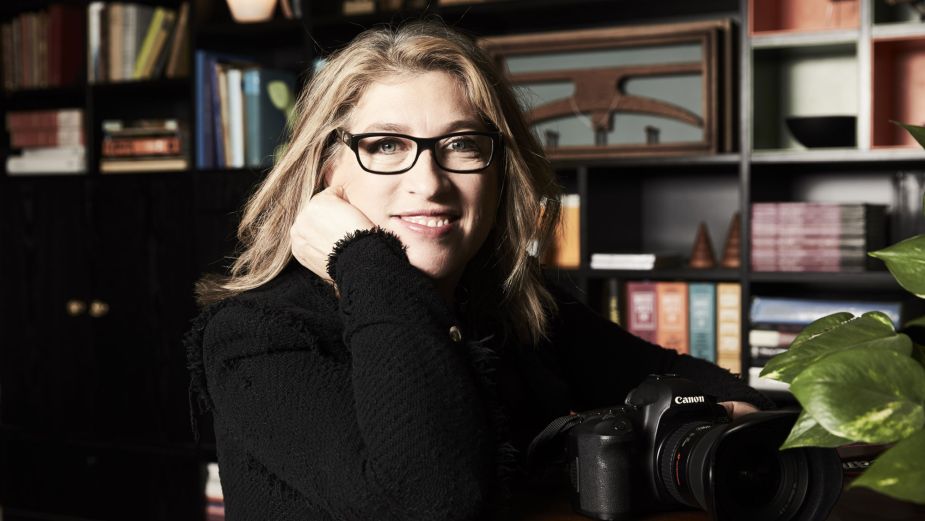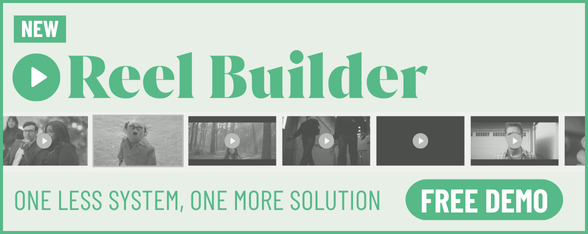
Lauren Greenfield on How Girl Culture Films Became INSTITUTE

Originally founded in 2019 by artist and documentary filmmaker/photographer, Lauren Greenfield, and her partner Frank Evers - an experienced producer and entrepreneur in the entertainment industry - Girl Culture Films was a production company initially created to represent female directors in the commercial space.
Earlier this month, it was announced that Girl Culture Films would be entering a new stage of its story as ‘INSTITUTE’. In the announcement, it was explained that this change will broaden the directorial roster to include more underrepresented talent regardless of gender, and offer greater integration with sister companies INSTITUTE ARTIST, the prestigious photo agency, and Girl Culture Studios.
To discuss these changes and the future developments of INSTITUTE, LBB’s Ben Conway caught up with Lauren and spoke about the newly expanded roster of directors, the industry’s current barriers for underrepresented talent, and what to expect from the production company going forward.

LBB> Firstly, congratulations on this new step for the future of your company. How did this new phase come about? Was the plan always to integrate Girl Culture more closely with INSTITUTE ARTIST?
Lauren> Frank Evers, my producer and partner, and I created the photo agency INSTITUTE ARTIST in 2009 with our UK-based co-founder, Matt Shonfeld - and from the beginning, we have been representing incredible photographers from all over the world. We started in the editorial world and later developed our commercial roster. We are now working with top brands like Apple, Levi's, and Nike, and we are really proud of the diverse photographers who are the reason INSTITUTE ARTIST has been recognised as one of the most prestigious photo agencies in the world.
We created Girl Culture Films in 2019 in response to the small number of female directors represented by commercial production companies. Commercial rosters consisted of predominantly white men, often with a lone female director who almost seemed like a token. What a difference three years makes! Now that more women are repped, directing, and winning awards, the struggle isn't over, but I felt this was the right time to expand into advocating for underrepresented directors, regardless of gender.
Last year, I joined the board of directors of #freethework, which had similarly expanded from its groundbreaking foundation by Alma Har’el as #freethebid. So that was an inspiration, too. To express this new evolution, we have changed our name to INSTITUTE, leaning into the synergy with our sister company INSTITUTE ARTIST.
LBB> What are you looking forward to achieving as a result of this new development? What new capabilities or projects does it open up for INSTITUTE?
Lauren> Frank and I have taken a multi-platform approach since we graduated from college. For many years we felt like aliens in a world of vertical specialists. We believed in the idea that storytelling and visual artists can work across multiple platforms and in a coordinated manner to achieve greater creative expression, audience reach, and cultural impact. I have been doing this in my photography, documentary films, and fine-art exhibition work for a long time, but the proof of concept in the commercial space was the #LikeAGirl campaign.
I did the photography as well as the video spot for the social experiment, and later, I was intimately involved with the launch of an integrated digital campaign. That project changed the scope of advertising campaigns, attracting unprecedented audience impressions and achieving a global social impact that we still feel seven years later. Making art that reaches wide audiences and drives social change is what we really love doing and is now more possible than ever before given the potent capabilities of new technology and media.
LBB> When it comes to creativity and storytelling, you and Frank are passionate about authenticity and diversity. How will INSTITUTE cultivate and embody these values?
Lauren> We have been in the business of deep, authentic, auteur-driven storytelling since day one, and the visual artists, documentary filmmakers, and commercial directors we represent and work with embody those same values. We will just keep focusing on working with diverse talent. We are looking for authentic storytellers with unique points of view that resonate with audiences. That naturally comes from diverse experiences and perspectives.
LBB> How will Girl Culture Films’ roster of directors be affected? You’ve already brought on five new directors - tell us about that.
Lauren> When we started, we more narrowly focused on representing female directors and documentary-based talent. Now we will aim to include a wider array of talent with varied aesthetic styles. That said, our talent will have something in common; a photographer’s creative vision, rooted in authentic and human storytelling. The directors we brought onto the roster all in their own ways exemplify the auteur-driven storytelling and individual perspectives we strive to uplift at INSTITUTE and always have:
Sandra Winther

Sandra is an incredible, cinematic storyteller who captures real people in narratives driven by deep human connections. Her acclaimed documentary short ‘Lowland Kids’ has evolved into a feature produced by Darren Aronofsky that is currently in post-production.
Tash Tung

Tash’s commercial, music video, and short film work blends art, pop culture, style, and real human experience. She uses clever camerawork and creates a playful quality that often nods to questions of identity.
Mikayla Gamble

Mikayla started in photography, quickly moved into motion, and brings to the table a fiercely talented eye for visuals, composition, and technique while telling compelling, poetic, emotional stories.
Courtney Brookes

Courtney is a sharp new voice in commercials, creating work that unapologetically combines stylised visuals, strong cinematic technique, and a wry sense of humour.
Bao Truong

Bao is an irreverent, but emotionally deep, director and creative director. He strives to tell stories of bridging two cultures, of identity and humanity, in both advertising and narrative work. He comes from a career working closely with creatives and clients at ad agencies, which has given him a valuable perspective that he brings to his directing work.
LBB> What are some of the largest barriers for underrepresented talent in the industry right now, and how can INSTITUTE—and the wider ad community—overcome them?
Lauren> We try to address underrepresentation by proactively identifying great talent and providing support through the bidding and directing process. We aim to help agencies and clients connect to their audiences by bringing them gifted collaborators with unique points of view. The point is not only diversity behind the camera but storytelling that connects with diverse consumers in powerful and effective ways.
There are systemic barriers. There is a club in advertising that is not necessarily intentionally exclusive, but that favours working with tried and true directors that an agency has worked with before. That tendency disadvantages underrepresented talent. Agencies have to be willing to take risks to get results. Safe bets never create groundbreaking work. When assessing a director, agencies should think about their vision and potential, rather than the presence of an identical spot on the reel.
The triple bid practice also disadvantages underrepresented talent. It sometimes seems agencies think it is enough to bid with diverse talent without awarding jobs to those directors. I helped design a survey at #freethework to examine how many jobs are awarded to underrepresented talent versus how many are bid. The results are discouraging, showing that female, non-binary, and non-white directors get fewer jobs than white men, proportionate to the jobs they bid for.
I challenge agencies to examine the diversity of their awards rather than their bids. The bidding process requires time and money. It is worthwhile when one has a proportionate possibility of winning the job. I would also like to see a world where directors are compensated for bidding. This would help level the playing field to include directors for whom bidding is a hardship.
LBB> What are some Girl Culture or INSTITUTE ARTIST projects that you look to as the kind of work you want to produce at INSTITUTE?
Thinx - Saved By Sister
We loved producing Pamela Adlon’s first advertising campaign for Thinx which brought her unique comedy style into a campaign that was perfect for her voice.
Planned Parenthood - Your Voice
Karyn Kusama has a stunning vision in features and series (‘Yellowjackets’), so bringing her horror aesthetic to the current ‘right to choose’ crisis with Planned Parenthood was a great opportunity.
Gates Foundation - Equality Can’t Wait
When Melinda Gates came to us through RGA, wanting to use comedy to address the tragic statistics around equality for women, Natasha Lyonne brought together a powerhouse group of comedians for the spot that was pitch-perfect.
LBB> What are some of INSTITUTE’s plans for the near future? Do you have any more developments or projects already in the works that you can tell us a bit about?
Lauren> I am wild about the photography of Thandiwe Muriu from Nairobi. She just did a campaign for Apple that you will be seeing soon, and I am super excited about mentoring her budding motion career.
Also, we are producing multiple documentary series for streamers on the entertainment side, and we are eager to produce in longer formats for the advertising world. When I did #likeagirl, no one thought that audiences had the patience for a two-minute-long piece! Two hundred million views later, every campaign wants a long version for the Internet. Short and feature films for advertising brands are next.
I am also very excited about the feature projects we are producing. Frank heads up the entertainment division ‘Girl Culture Studios’, where we are developing our commercial director Claire Edmondson’s first film, as well as an innovative hybrid documentary by Ro Haber. We are also developing a fiction series based on one of my works, as well as our first musical!
LBB> And what are the long-term goals for INSTITUTE? Will we see complete integration of the two companies? Or expansions into different capabilities?
Lauren> We will continue to expand the INSTITUTE brand globally and across all media that has applications for our talent. INSTITUTE and INSTITUTE ARTIST are independent entities, but we want to continue to create synergies for unified visions across motion and print through a global talent pool, and multi-platform production capabilities that can serve agencies, brands, streamers, and cultural institutions. We will also continue our mission of amplifying underrepresented voices and supporting aesthetic storytelling with social impact.















